新编大学英语第三版book2 unit 3
- 格式:pdf
- 大小:10.71 MB
- 文档页数:81
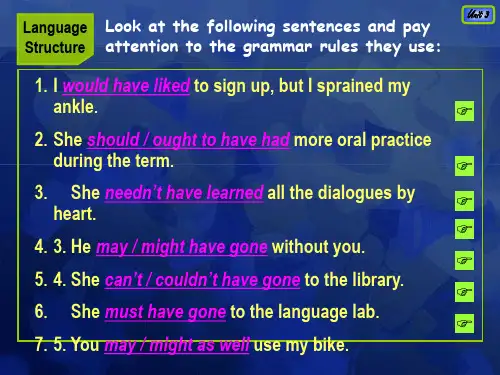
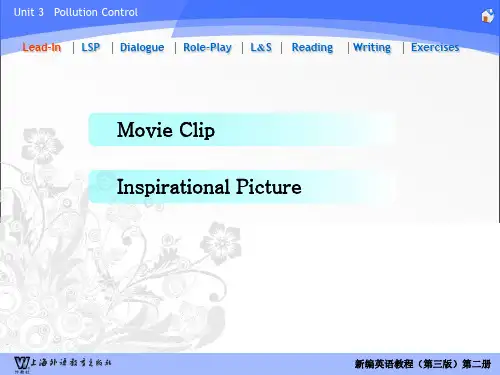
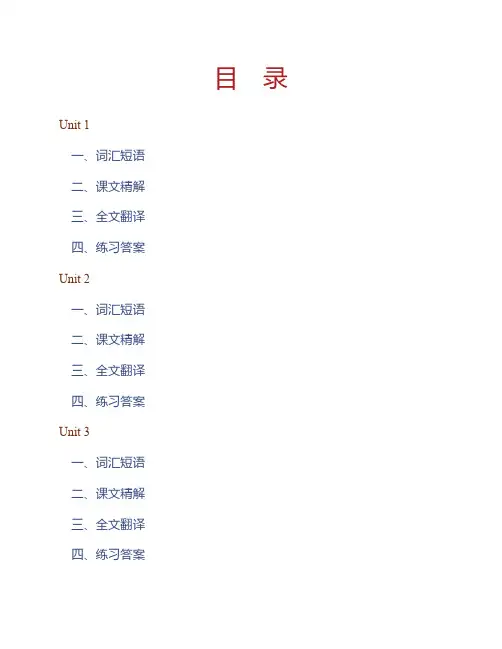
目 录Unit 1一、词汇短语二、课文精解三、全文翻译四、练习答案Unit 2一、词汇短语二、课文精解三、全文翻译四、练习答案Unit 3一、词汇短语二、课文精解三、全文翻译四、练习答案Unit 4一、词汇短语二、课文精解三、全文翻译四、练习答案Unit 5一、词汇短语二、课文精解三、全文翻译四、练习答案Unit 6一、词汇短语二、课文精解三、全文翻译四、练习答案Unit 7一、词汇短语二、课文精解三、全文翻译四、练习答案Unit 8一、词汇短语二、课文精解三、全文翻译四、练习答案Unit 9一、词汇短语二、课文精解三、全文翻译四、练习答案Unit 10一、词汇短语二、课文精解三、全文翻译四、练习答案Unit 1一、词汇短语Part 1. Preparationby its very nature就其本质而言unconditional [5QnkEn5diFEnEl] adj.无条件的,无限制的,绝对的【例句】The victorious army demanded unconditional surrender. 胜方要求敌人无条件投降。
【搭配】unconditional surrender 无条件投降live up to不辜负;做到;实践【例句】In some ways, we failed to live up to one another’s expectations. 在某些方面,我们互相的期望都落了空。
do one’s duty尽职责Part 2. Reading-Centered ActivitiesIn-Class Readingseverely [si5viEli] adv.严格地,激烈地【例句】Those responsible for this crime will be severely punished. 犯下这宗罪行的人将受到严厉惩罚。
severe [si5viE] adj.严厉的,严格的;剧烈的;严重的,严峻的【例句】He’s suffering from severe mental disorder. 他患有严重的精神病。
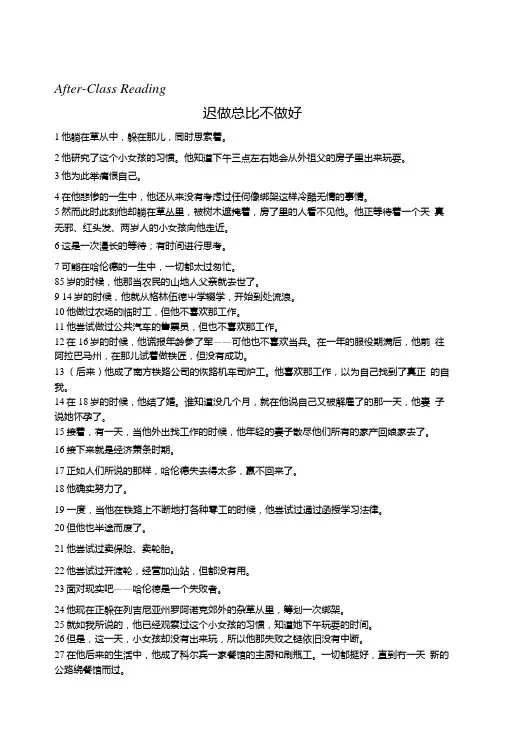
After-Class Reading迟做总比不做好1他躺在草从中,躲在那儿,同时思索着。
2他研究了这个小女孩的习惯。
他知道下午三点左右她会从外祖父的房子里出来玩耍。
3他为此举痛恨自己。
4在他悲惨的一生中,他还从来没有考虑过任何像绑架这样冷酷无情的事情。
5然而此时此刻他却躺在草丛里,被树木遮掩着,房了里的人看不见他。
他正等待着一个天真无邪、红头发、两岁人的小女孩向他走近。
6这是一次漫长的等待;有时间进行思考。
7可能在哈伦德的一生中,一切都太过匆忙。
85岁的时候,他那当农民的山地人父亲就去世了。
9 14岁的时候,他就从格林伍徳屮学辍学,开始到处流浪。
10他做过农场的临时工,但他不喜欢那工作。
11他尝试做过公共汽车的售票员,但也不喜欢那工作。
12在16岁的时候,他谎报年龄参了军——可他也不喜欢当兵。
在一年的服役期满后,他前往阿拉巴马州,在那儿试着做铁匠,但没有成功。
13 (后来)他成了南方铁路公司的恢路机车司炉工。
他喜欢那工作,以为自己找到了真正的自我。
14在18岁的时候,他结了婚。
谁知道没几个月,就在他说自己又被解雇了的那一天,他妻子说她怀孕了。
15接着,有一天,当他外出找工作的时候,他年轻的妻子散尽他们所有的家产回娘家去了。
16接下来就是经济萧条时期。
17正如人们所说的那样,哈伦德失去得太多,赢不回来了。
18他确实努力了。
19 一度,当他在铁路上不断地打各种零工的时候,他尝试过通过函授学习法律。
20但他也半途而废了。
21他尝试过卖保险、卖轮胎。
22他尝试过开渡轮,经营加汕站,但都没有用。
23面对现实吧——哈伦徳是一个失败者。
24他现在正躲在列吉尼亚州罗阿诺克郊外的杂草从里,筹划一次绑架。
25就如我所说的,他已经观察过这个小女孩的习惯,知道她下午玩耍的时间。
26但是,这一天,小女孩却没有出来玩,所以他那失败之链依旧没有中断。
27在他后来的生活中,他成了科尔宾一家餐馆的主厨和刷瓶工。
一切都挺好,直到冇一天新的公路绕餐馆而过。
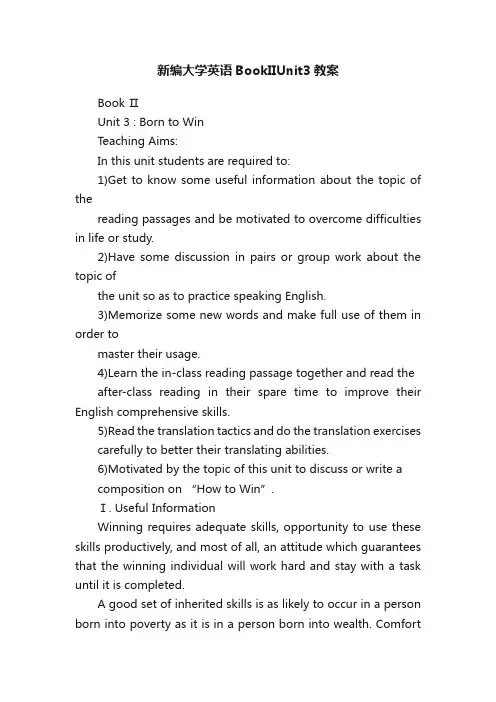
新编大学英语BookIIUnit3教案Book ⅡUnit 3 : Born to WinTeaching Aims:In this unit students are required to:1)Get to know some useful information about the topic of thereading passages and be motivated to overcome difficulties in life or study.2)Have some discussion in pairs or group work about the topic ofthe unit so as to practice speaking English.3)Memorize some new words and make full use of them in order tomaster their usage.4)Learn the in-class reading passage together and read theafter-class reading in their spare time to improve their English comprehensive skills.5)Read the translation tactics and do the translation exercisescarefully to better their translating abilities.6)Motivated by the topic of this unit to discuss or write acomposition on “How to Win”.Ⅰ. Useful InformationWinning requires adequate skills, opportunity to use these skills productively, and most of all, an attitude which guarantees that the winning individual will work hard and stay with a task until it is completed.A good set of inherited skills is as likely to occur in a person born into poverty as it is in a person born into wealth. Comforthas often been the curse of the wealthy, and there is little support for the idea that a life of ease will lead to a life as a winner.In nearly every field of work or profession there are winners who have come from humble beginnings. In these books such as: Rags to Riches, Risen from the Ranks, facing the World, The Young Explorer, the hero figure comes from a humble beginning, but through hard work, serious study, attention to the rules, and good virtue, he becomes a winner in life. Indeed, these books became the introduction for many young Americans to the co ncept that “Whenthe going gets tough, the tough get going.” It may be true that virtue is not always rewarded, but most persons behave as if in fact this is usually true. Sayings like “Honesty is the best policy”, “Nothing succeeds like success”, “Genius is more often due to perspiration than inspiration”, “Winners never lose, losers never win”are so common that they sometimes are not appreciated for the influence they have on young persons.In addition, there are many stories of athletes, artists, musicians and actors, etc., who have overcome great handicaps to become winners in their fields of performance. The next time when you see a person who is a winner in life, remember that it is not that they were “born to win”. The usual case is that they had formed good habits of learning and living, and they had an attitude which caused them to succeed and never to consider defeat or loss as an acceptable outcome.Ⅱ. Preparation1.Talk about the meaning of winning. Ask students to talkabout “What does winning mean?”Samples:1)Winning means being happy.2)Winning means being No.1 or one of the best in your field.3)Winning means being able to make great contributions tosociety.4)Winning means being able to overcome great difficulties thatothers can’t.5)Winning means making a lot of money.6)Winning means doing what you enjoy and being good at it.7)Winning means having good health and a happy family.8)Winning means that you can be the kind of person you want tobe.2.Winners in my eyes. Ask students to give an example of thewinner in their eyes.Samples:1)I think Helen Keller is a winner. Even though she becameblind and deaf at a very early age, she didn’t give up. With the help of her teacher, she became a teacher, writer andlecturer. She couldn’t see or hear, but shi learned to read andwrite by touch and feel. Helen also learned several foreign languages: French, German, Latin and Greek. Helen always wanted to try what others could do.2)For me, my father is a winner. He was born into a very poorfamily. He hardly had enough to eat. Every week he had to walk 20 kilometers to school. Though he dropped out later due to the lack of money, he taught himself and became a teacher at a village school. He sent my brothers and me to school. Now my brothers and I are all studying in nationalkey universities. For others, my father may be a very ordinary person. But to me, he is a real winner.3.What accounts for success? Read the story with the students,then ask them to conclude the moral of the story. Give their o pinions on “What Accounts for Success?”Samples:I think intelligence and hard work are the most importantthings. First you must be intelligent. You won’t he able to succeed if you are stupid. But intelligence alone is not enough. You also need to work hard. Success is something you have to earn painstakingly.Ⅲ. Listening-Centered ActivitiesViewing, Understanding And SpeakingPlay the video for at least three times. For the first time, the students are expected to only watch and enjoy it, then the second time to do exercises, the third time the teacher can stop the video appropriately with explanation about the difficulties.For listening exercises One, Two, Three, the teacher can play them several times with relevant explanations as well. Besides, More Listening exercises can be chosen if time permitted.In-class readingIV. In-Class ReadingWords, Phrases and Grammatical Points1.capability (l.4) / capacity (l.12)capability1)the quality of being able to do something; ability 能力,才能,性能e.g.I.You have the capability of doing this job well.II.Does the company have the capability to change to meet market needs?2)the ability that a country has to take a particular kind ofmilitary action军事能力e.g.In fact the country has no military capability of its own.capacity1) someone’s ability to produce, experience, understandor learn something能力,才能e.g.I.Our capability for giving care, love and attention islimited.Ⅱ. Children have a remarkable capacity to learn language.3)the amount of space a container, room, etc. has to holdthings or people容量,容积e.g.I.This bottle has a large capacity.II.The room has a seating capacity for about 80.4)the amount of something that a factory, company,machine, etc. can produce or deal with产量,生产力e.g.I.All factories are working at full capacity.II.The company has the capacity to build 1,500 trucks a year.5) a particular position or duty职位,身份e.g.I.She is employed by them in an advisory capacity.II.I attended the meeting in my capacity as chairman of the safety committee.2.limit (n.) / limitation (l.4)limit n.1)the point, edge, or line beyond whichsomething cannot or may not proceed限度,界限e.g.I.No fishing is allowed within a twenty-milelimit.II.He has not been outside the limits of theprison walls for 20 years.2)the greatest or least amount, number, speed,etc. that is allowed or possible限额e.g.I.The speed limit on this road is 70 mph.II.He borrowed money up to the limit that thebank allowed.limitation1)a shortcoming or defect, a condition of limited ability局限,缺陷,弱点e.g.I.He knows his capabilities and limitations.II.The European Community should recognize its limitations.2)the act of limiting or the state of being limited限制,限度e.g.I.They resist any limitation of their powers.II.Such limitation on women’s powers cuts into all classes and races.3)the condition, fact or circumstance that limits限制因素e.g.I.There are also technical limitations.II.The government imposed limitations on exports.3.chance (l.12)1)the possibility that something will happen 可能性e.g.I.The chance of rain is less than 20%.II.What are her chances of survival?III.You’d have more chance of catching the train ifyou got a bus to the station instead of walking.2)an opportunity for you to do something,especially something you want to do 机会e.g.I.We work together whenever we get a chance.II.I can explain everything if you’ll just give me a chance.III.You should take the chance to travel while you’restill young.4.enter (l..45)1)come or go into 进入,进来e.g.I.The thieves entered the building by the back door.II.Few reporters dared to enter the war zone.2)become a member of 加入,成为……的成员e.g.I.She entered the club last year.II.Both boys entered the army.3)begin or become involved in an activity, a situation, etc. 参加,加入e.g.I.Everyone in the class entered the race.II.At least 30 schools entered the competition.4)put information into a computer or be given permission to use a computer system储存(信息),允许使用(计算机系统)e.g.I.Press the return key to enter the information.II.The syst em won’t let you enter without a password. Structure of the passage:1) Introduction (para. 1)Each person has the potential to win in his own way.2) The meanings of “winner” and “loser” (para. 2)A winner is one who responds genuinely by being trustworthy and responsive.A loser is one who fails to respond genuinely.3) Few people are winners and losers all the time. (pare. 3)4) Winners (para. 4—7)Characteristics of a winner:A. A winner is genuine.B. A winner is not afraid to do his own thinking and to use his own knowledge.C. A winner has a love for life.D. A winner cares about the world and its people.5) Losers (para. 8—10)Possible causes: Poor nutrition, cruelty, unhappy relationships, disease, continuing disappointments and inadequate physical care. Characteristics of a loser:A. A loser lacks an ability to appropriately express himself through a full range of possible behavior.B. A loser has difficulty giving and receiving love.Questions for Group Discussion:Directions: Work in groups to discuss the following questions.1) What characteristics do winners or losers have?2) Do you consider yourself a winner? What do you need tobecomea winner?Translation:Lack of confidence contributed to his failure.She has shown great courage in the face of her serious illness.We came to the conclusion that she was telling the truth.His secretary failed to tell him about the meeting.Learning languages isn’t a matter of memorizing words.Once she has made her decision, no one can hold her back.It will be difficult to live up to the standards set by our captain.The scientist referred to the discovery as the most exciting new development in this field.V. Further DevelopmentProverbs:Failure is the mother of success.Any man who is afraid of failure will never win.Success means that you enjoy and are good at doing what you are doing now.One who is eager to win will not necessarily win quickly.A successful person doesn’t ask for things from others. On the contrary he will ask himself: “What can I leave to this world?”A real winner is someone who makes the greatest contributions to the society, not the one who is the richest, or the most famous. Writing.Some people say winning means being rich, some people say winning means being powerful, and other people say winning means being happy. Please write a paragraph of about 120 words about YOUR understanding of winning.。
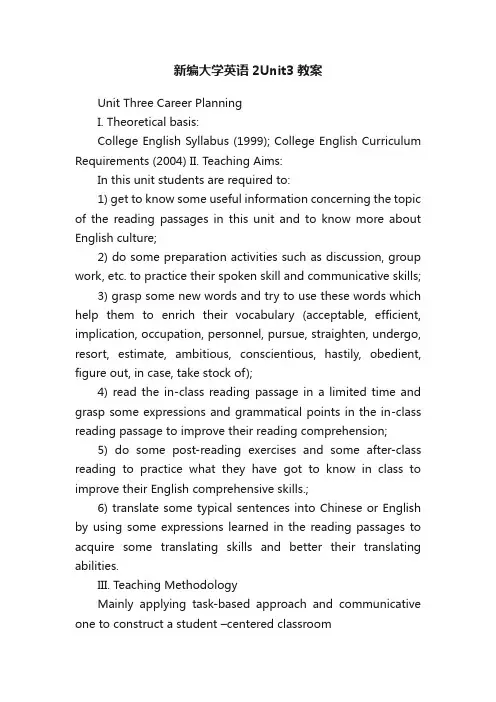
新编大学英语2Unit3教案Unit Three Career PlanningI. Theoretical basis:College English Syllabus (1999); College English Curriculum Requirements (2004) II. Teaching Aims:In this unit students are required to:1) get to know some useful information concerning the topic of the reading passages in this unit and to know more about English culture;2) do some preparation activities such as discussion, group work, etc. to practice their spoken skill and communicative skills;3) grasp some new words and try to use these words which help them to enrich their vocabulary (acceptable, efficient, implication, occupation, personnel, pursue, straighten, undergo, resort, estimate, ambitious, conscientious, hastily, obedient, figure out, in case, take stock of);4) read the in-class reading passage in a limited time and grasp some expressions and grammatical points in the in-class reading passage to improve their reading comprehension;5) do some post-reading exercises and some after-class reading to practice what they have got to know in class to improve their English comprehensive skills.;6) translate some typical sentences into Chinese or English by using some expressions learned in the reading passages to acquire some translating skills and better their translating abilities.III. Teaching MethodologyMainly applying task-based approach and communicative one to construct a student –centered classroomThe whole learning and teaching proceed is tended to follow the model of pre-task------task cycle------post-taskIV. Time DistributionAccording to Ss’English learning traits and regulations, the focus of the learning strategies, and the English level of current students; we are going to finish this unit in 8 periods: Listening & Speaking (2 periods); In-class Reading (6 periods); Exercise & After-class Reading (1 periods); Further Development &Writing (1 periods).Period I&II listening and speakingI、Teaching Content1) T’s background knowledge introduction as recruitment and Ss’ discussion onthe topic of career planning, and enlarge their vocabulary on this unit.2) Listening of 1 passagesII、Teaching designPart One: Preparation1. Name different occupationsDescribe pictures: You will have 3 minutes to list as many names of occupations as possible.singer, dancer, actor, writer, accountant, waiter, librarian, secretary, estate agent,fashion designer, composer, editor, psychologist, dentist, driver, economist, engineer, politician, salesman, gardener , craftsman, broadcaster2. Describe a career you’re likely to pursue in the future. Don’t mention its name but ask your classmates to guess what it is.Sample:The job I’d prefer to take has a flexible working schedule. I don’t have to be at work exactly on time. Much of my time will be spent sitting in front of the computer or going through the work written by others. When work is due, I will have to burn the midnight oil. But when there is no work, I can take time to enjoy myself even if I’m still at work. This job needs a lot of initiative and independence. I’ll have to contact potential writers all by myself and choose the topics and books that might sell well or have good academic value. I’ll ne ed to be very careful, doing the proofreading many times until a book is finally published.Scientific, social, realistic, artistic, computational, practical, nature, outdoor, active, conventional, technical, organization, files, machines, laboratory jobs, music, teach, help, sales job, political jobsScientific——are you interested in knowing how and why things work?Social ——are you interested in caring for others and helping them with their problems?General service ——would you like a job which involves offering service to other people?Artistic —— would you like to use artistic or creative abilities?Computational ——do you have an aptitude for working with figures or solving mathematical problems?Nature ——are you interested in working with plants or animal?Outdoor/active ——would you like to be out and be physically active? Leadership——are you interested in persuading people to do something? Conventional ——would you like to work with organizations, files and regular schedules.give some examples to your chosen category.Scientific: scientists, research workers, chemists, biologists, etc.Social: teachers, doctors, psychologists, layers, etc.General service: volunteers, policeman, etc.Artistic: singers, actors, directors, pianists, violinists, etc.Computational: accountant, cashier, statistician, etc.Nature: biologists, zoologists, botanists, etc.Outdoor/active: sportsmen, explorers, mountaineers, etc.Leadership: politician, salesmen, retailer, etc.Conventional: civil servant, secretary, etc.3. Top 10 jobs:software engineerInsurance agentdoctorsexcellent Tour guideBiomedical engineerCadet teacherSystem designerEstate agentProject managerCustoms agent4. What factors will influence you in choosing a job?---a high salary---lots of perks (e.g. a company car, travel expenses, vacation) ---good promotion prospects.---an opportunity, through your job, to sever others in the community /insociety.---pleasant, friendly working atmosphere.---short working hours---not more than 35 hours a week.---a good boss---pleasant colleagues---career orientation---suitable for one’s natural/professional talents/skills---interesting tasks---good safety record---clean environment---canteen for the staff---good location (near bus stop, etc)---opportunities for travel---opportunities for professional development /job training ---daycare facilities---school nearbyPart Two: Listening-centered Activities1.What kind of job is suitable for you?Listen to 14 statements carefully and decide which category of jobs they belong to.What do you think the most ideal occupation is?How are you preparing for your future career?What are the steps to get a world-class job?2. Video clipCareer choice is always a hard decision for mothers. They, on the one hand, may like to stay at home looking after their babies and on the other hand, may like to fulfill their own personal career development as well. Watch the video and see what is Mar ilyn’s problem and guess her decision.Part Three: Assignmentto prepare the new words on the textbook.Period 3&4 ReadingI、Teaching ContentThe title of the text is ―Career Planning‖(intensive reading). Language points explanation, exercise.II、Teaching Objects1)Understand and master new words and phrases: course of action, hyper-, inreality, not much, at stake, confront, face, resort to, seize on, work out, in case, every so often, take steps to do sth, talk over, etc.3) Improve Ss micro-reading skills and the ability of thinking, inference andjudge in English.III、Teaching DesignA. GreetingB. Check the assignment: new words dictationC. Pre-Reading ActivitiesWork in pairs and discuss the following questions.1. Are you planning your future career? If so, what is the career you are aiming for?2. How are you preparing for your future career?Enriching Your Word Power1. invent -inventorlogical -illogicalmoral -immoralpursue -sued, -suinge.g. Bad luck pursued us. 厄运纠缠着我们。
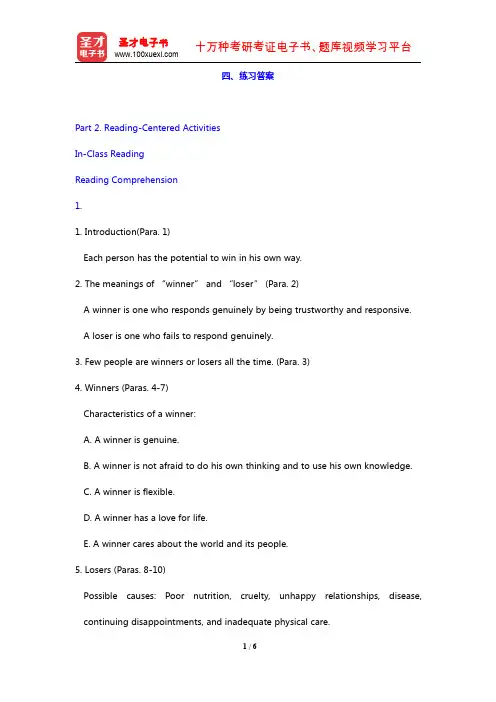
四、练习答案Part2.Reading-Centered ActivitiesIn-Class ReadingReading Comprehension1.1.Introduction(Para.1)Each person has the potential to win in his own way.2.The meanings of“winner”and“loser”(Para.2)A winner is one who responds genuinely by being trustworthy and responsive.A loser is one who fails to respond genuinely.3.Few people are winners or losers all the time.(Para.3)4.Winners(Paras.4-7)Characteristics of a winner:A.A winner is genuine.B.A winner is not afraid to do his own thinking and to use his own knowledge.C.A winner is flexible.D.A winner has a love for life.E.A winner cares about the world and its people.5.Losers(Paras.8-10)Possible causes:Poor nutrition,cruelty,unhappy relationships,disease, continuing disappointments,and inadequate physical care.Characteristics of a loser:A.A loser lacks the ability to appropriately express himself through a full range of possible behavior.B.A loser has difficulty giving and receiving love.2.1.C2.A3.A4.B5.C3.OmittedVocabulary1.1.appreciateA.be pleased about sth.that sb.has done for you感激B.recognize its good qualities欣赏,赏识2.capacityA.the amount that sth.can hold or contain容量,容积,容纳力B.ability or power能力,才能3.channelA.(n.)band of frequencies used for a particular set of radio or television programmes频道B.(v.)arrange for them to be used for that thing,rather than for a wider range of things调拨4.contributeA.join with others in giving捐献,捐赠,贡献出B.help in causing a situation,event,or condition有助于,促成5.flexibleA.that can bend easily without breaking有弹性的,柔韧的B.easily changed to suit new conditions灵活的,可变通的6.guiltA.the state of having committed an offense罪,罪行B.remorse caused by feeling responsible for some offense内疚,自责,悔恨7.potentialA.(adj.)that may happen or become so潜在的,可能的B.(n.)(the degree of)possibility for developing or being favorably developed潜力,潜能8.rigidA.stiff;not bending or yielding硬的,不易弯曲的B.strict;firm;unchanging严格的,刻板的2.3.Translation1.A lot of things contributed to the end of my relationship with that company.2.She showed great courage in the face of serious illness.3.We came to the conclusion that she was telling the truth.4.His secretary failed to tell him about the meeting.5.Learning a language isn’t just a matter of memorizing words.6.Once she has made her decision,no one can hold her back.7.They said they would study hard and live up to their parents’expectations.8.The scientist referred to the discovery as the most exciting new discovery in this field.Part3.Further Development1.Grammar Review1.Had they signed the contract ahead of time,they could not have missed the plan.2.Had we not been interrupted yesterday,we would have finished the work.3.Had he not been working hard in the past five years,things wouldn’t be going so smoothly.4.Were they to cease advertising,prices would be significantly reduced.5.Had you taken his advice,you wouldn’t have made such a mistake.2.Vocabulary Review3.Winners or Losers?Omitted4.Live Your DreamsOmitted5.An Interview with a Successful WriterOmitted6.That’s Me!OmittedPart4.Translation and Writing2.Translation Practice1.Failure is the mother of success.2.Any man who is afraid of failure will/can never win!3.Success means that you enjoy/love and are good at doing what you are doing now.4.One who is eager to win may not necessarily win quickly.5.A successful person doesn’t ask for things from others.On the contrary/Instead, he will ask himself:“What can I leave to this world?”6.A real winner is someone who makes the greatest contributions to society,not the one who is the richest or the most famous.3.WritingOmitted。

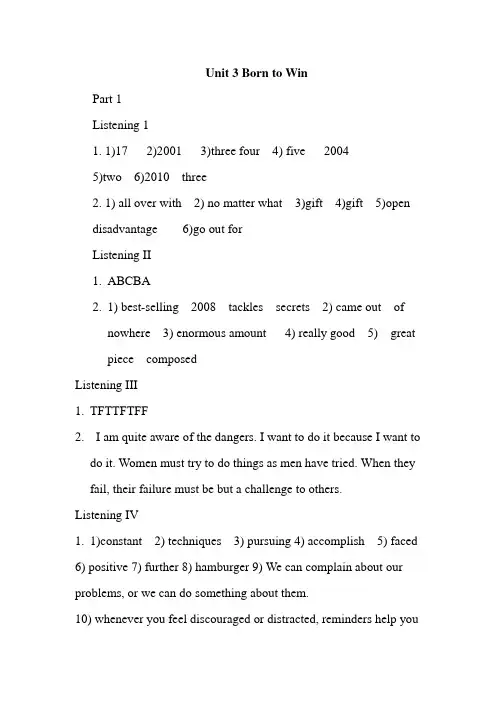
Unit 3 Born to WinPart 1Listening 11. 1)17 2)2001 3)three four 4) five 20045)two 6)2010 three2. 1) all over with 2) no matter what 3)gift 4)gift 5)opendisadvantage 6)go out forListening II1.ABCBA2.1) best-selling 2008 tackles secrets 2) came out ofnowhere 3) enormous amount 4) really good 5) greatpiece composedListening III1.TFTTFTFF2.I am quite aware of the dangers. I want to do it because I want todo it. Women must try to do things as men have tried. When they fail, their failure must be but a challenge to others.Listening IV1.1)constant 2) techniques 3) pursuing 4) accomplish 5) faced 6) positive 7) further 8) hamburger 9) We can complain about our problems, or we can do something about them.10) whenever you feel discouraged or distracted, reminders help youget back on track. 11) The more your mind stays focused on your goal, the faster you will get your results.Part 21.6,4,7,2,1,8,3,52.1)end 2)had no choices support 3)believe it out of touch pay 4)settle as dull colleagues 5)put off 6)meant a total failure 7) abandonedPart 31.Picking up a habit or abandoning one.2.From Morgan Spurlock,the great American philosopher.3.He has managed to take pictures,one day each,for 30 days.He biked to work for a month.And he ended up hiking up the highest mountain in Africa.He wrote a 50000-word novel.4.To support his argument that people have the potential to finish certain tasks,if determined,that might initially seem impossible given only 30 days.5.Small changes are more likely to stick.6.Just take a look at his expression when he mentioned theword”suger”.It will be a big challenge for him.If he gives up sugar or 30 days,he will eat more afterward.7.He asks a question:What are you waiting for?But I would say it is more of a suggestion than a question.He is trying to promote thisidea of making a challenge within 30 days and sell it to his audience.Part 4Listening Ι1.1,2,42.1)authority 2)hoping for a chance 3)changing our ideas ,closest relatives 4)most recent studiesListening Ⅱ1. 1)1782 2)1795 3)his late twenties2. 1,3,5,6,8,9,10Listening Ⅲ1. 4,6,72.A,A,D,C,DListening Ⅳ1)seventh 2)encourages 3)performed 4)amused 5)natural 6)musical 7)1960s 8)form 9)Despite 10)distinguished。
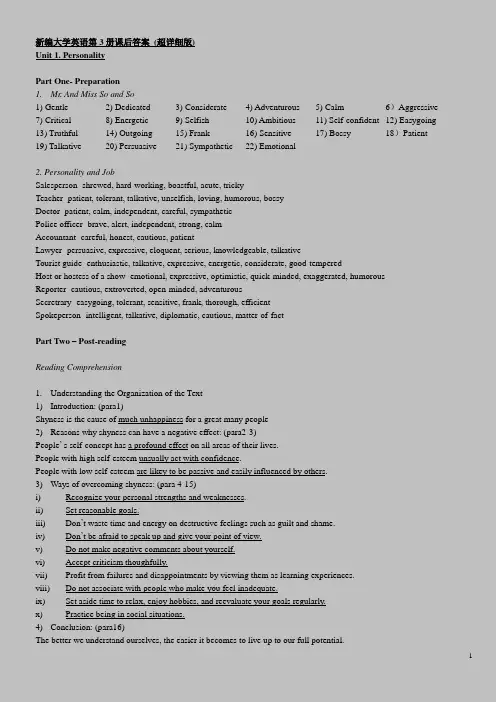
新编大学英语第3册课后答案(超详细版)Unit 1. PersonalityPart One- Preparation1.Mr. And Miss So and So1) Gentle 2) Dedicated 3) Considerate 4) Adventurous 5) Calm 6)Aggressive 7) Critical 8) Energetic 9) Selfish 10) Ambitious 11) Self-confident 12) Easygoing 13) Truthful 14) Outgoing 15) Frank 16) Sensitive 17) Bossy 18)Patient 19) Talkative 20) Persuasive 21) Sympathetic 22) Emotional2. Personality and JobSalesperson- shrewed, hard-working, boastful, acute, trickyTeacher- patient, tolerant, talkative, unselfish, loving, humorous, bossyDoctor- patient, calm, independent, careful, sympatheticPolice officer- brave, alert, independent, strong, calmAccountant- careful, honest, cautious, patientLawyer- persuasive, expressive, eloquent, serious, knowledgeable, talkativeTourist guide- enthusiastic, talkative, expressive, energetic, considerate, good-temperedHost or hostess of a show- emotional, expressive, optimistic, quick-minded, exaggerated, humorousReporter- cautious, extroverted, open-minded, adventurousSecretrary- easygoing, tolerant, sensitive, frank, thorough, efficientSpokeperson- intelligent, talkative, diplomatic, cautious, matter-of-factPart Two – Post-readingReading Comprehension1.Understanding the Organization of the Text1)Introduction: (para1)Shyness is the cause of much unhappiness for a great many people2)Reasons why shyness can have a negative effect: (para2-3)People’ s self-concept has a profound effect on all areas of their lives.People with high self-esteem unsually act with confidence.People with low self-esteem are likey to be passive and easily influenced by others.3)Ways of overcoming shyness: (para 4-15)i)Recognize your personal strengths and weaknesses.ii)Set reasonable goals.iii)Don’t waste time and energy on destructive feelings such as guilt and shame.iv)Don’t be afraid to speak up and give your point of view.v)Do not make negative comments about yourself.vi)Accept criticism thoughfully.vii)Profit from failures and disappointments by viewing them as learning experiences.viii)Do not associate with people who make you feel inadequate.ix)Set aside time to relax, enjoy hobbies, and reevaluate your goals regularly.x)Practice being in social situations.4)Conclusion: (para16)2. Understanding Specific Information1) F 2) T 3) T 4) T 5) F 6)T 7)F 8)F 9)TVocabulary1.1)self-couscious (worried and embarrassed about what you look like or what other people think of you.)2)self-confidence (belief in one’s own ability, power, judgment, etc,; confidence in oneself)3)self-esteem (the feeling that you are someone who deserves to be liked, respected, or admired)4)self-destructive (with thoughts or actions that are counter to one’s own best interests)5)self-worth (the value you give to your life and achievements)6)self-concept (one’s conception or general idea of one’s own basic character and nature)7)self-awareness (realistic knowledge and judgment about oneself)8)self-assurance/self-confidence (the belief that you are able to deal with people and problems easily)2.1) B 2 ) I 3) L 4) A 5) H 6) D 7) E8) N 9) J 10) M 11) C 12) F 13) G 14) K3.1) profound 2)jealousy 3) numerous 4)overweight 5) overcome6) eventually 7) slim 8) compliments 9) diminish 10) reassurance11) detrimental 12) isolated 13) self-esteem 14) accented4.1) reflected 2) concerned/worried 3) profound effect/influence 4) viewed/regarded5) sensitive 6) respond/ react 7) eliminated 8) overcome my fear9) concentrate on 10) made no commentTranslation1)You should spend a reasonable amount of time relaxing and exercising.(spend time on sth/ in doing sth)2)In general children are healthier and better educated than ever before. (than ever before)3)When the right opportunity comes along, he’ll take it.4)Every day he sets aside some time to be with his family and enjoy life.5)I remember those dark streets and walking hand in hand with my father.6)He finally failed to live up to his parents’ expectations.7)In contrast, our use of oil has increased enormously.8)He succeeded in his efforts to overcome his fatal weakness.Part Three – Further Development1. Enriching Your Word Power1) B 2)B 3)A 4) B 5) D 6) C 7)B 8)C 9)A 10)A 11) C 12) BPart Four- Writing and Translation2.1) It is believed that pessimism often leads to hopelessness, sickness and failure.2) Optimism, by contrast, can make you happy, healthy and successful.3) When you fail in something, profit from the failure as a learning experience.4) Think about your strengths and build up self-confidence in front of problems or difficulties.6)Everyone has experienced failures and disappointments, so don’t blame yourself too much.Unit 2 Myths and LegendsPart One – Preparation4. Matching Pictures1. Aphrodite2. Ares3. Hephaestus4. Artemis5. Demeter6. Dionysus7. Poseidon 8. Athena 9. Apollo 10. hermes 11. Hera 12. ZeusPart Two – Post-reading1. Testing Your Memory1) Because they were invited to a feast in the sky.2) He saw the birds were busy preparing.3) He planned to go to the feast/ sky with the birds.4) They didn’t agree because Tortoise was mischievous/ cunning and ungrateful.5) With a sweet tongue, he convinced the birds that he was a changed man.6) He made two wings with all the features he got from each bird.7) All of You.8) Nuts, meat and fish soup, punded yam, yam soup, palm wine, etc.9) For whom have you prepared this feast?10) Because he knew the answer would be “For all of you”, which was his new name. So he could enjoy all the food first.11) They were very angry.12) They took back the feathers they had lent him.13) He asked him to take a message to his wife.14) Parrot, because he wanted to take advantage of the chance to get revenge.15) He asked Parrot to tell his wife to bring out all the soft things in his house and cover the ground with them so that he would be able to land safely. But Parrot told his wife to bring out all the hard and sharp things instead.16) His shell was broken into hundreds of pieces.Vocabulary1.1) A. invitation B. invited C. inviting2) A. prepare B. prepared C. preparation D. preparatory / preparation3) A. discoveries B. discoverers C. discovered4) A. approval B. approve C. approved D. approvign E. disapprove5) A. eloquent B. eloquence C. eloquently6) A. faithful B. unfaithful/ faithless C. faith D. faithfully7) A. occasional B. occasionally C. occasion8) A. delivery B. delivering C. delivered9) A. troubesome B. troulbed C. troubled D. troubling10) A. assurance B. assured C. assure2.1) got/ran into trouble 2) no trouble 3) asking for trouble 4) have…trouble5) trouble with 6) in serious/ deep/ big trouble 7) get/getting …into trouble 8) took the trouble3.1) with a pattern of roses.2) prepared a wonderful / good meal for us3) promised faithfully4) deliver this letter5) a selection of milk and plain chocolate7)the sound of distant thunder8) received approval from the government9) in spite of the fact that he drank too much10)agree whether the drug is safe or notPart Three – Further Development1.Enriching Your Word Power1) C 2) C 3) A 4) B 5)A 6) B 7) A 8) B 9) B 10) A 11) B 12) APart Four – Writing and Translation2.Translation Practice万物之初,天体还是一体,充满混沌。
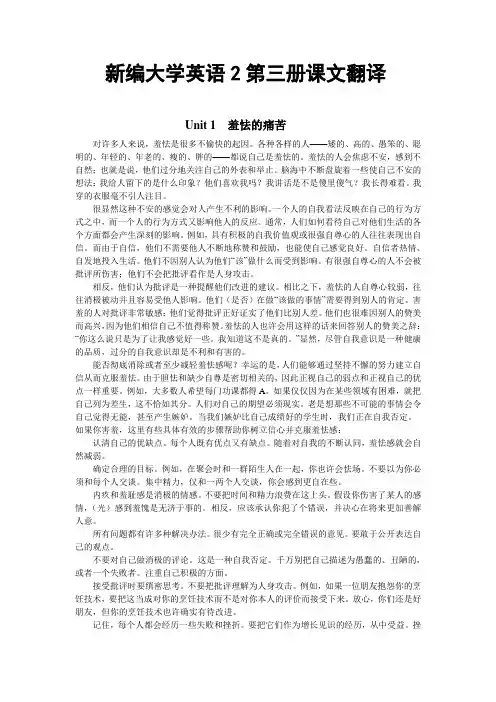
新编大学英语2第三册课文翻译Unit 1 羞怯的痛苦对许多人来说,羞怯是很多不愉快的起因。
各种各样的人——矮的、高的、愚笨的、聪明的、年轻的、年老的、瘦的、胖的——都说自己是羞怯的。
羞怯的人会焦虑不安,感到不自然;也就是说,他们过分地关注自己的外表和举止。
脑海中不断盘旋着一些使自己不安的想法:我给人留下的是什么印象?他们喜欢我吗?我讲话是不是傻里傻气?我长得难看。
我穿的衣服毫不引人注目。
很显然这种不安的感觉会对人产生不利的影响。
一个人的自我看法反映在自己的行为方式之中,而一个人的行为方式又影响他人的反应。
通常,人们如何看待自己对他们生活的各个方面都会产生深刻的影响。
例如,具有积极的自我价值观或很强自尊心的人往往表现出自信。
而由于自信,他们不需要他人不断地称赞和鼓励,也能使自己感觉良好。
自信者热情、自发地投入生活。
他们不因别人认为他们“该”做什么而受到影响。
有很强自尊心的人不会被批评所伤害;他们不会把批评看作是人身攻击。
相反,他们认为批评是一种提醒他们改进的建议。
相比之下,羞怯的人自尊心较弱,往往消极被动并且容易受他人影响。
他们(是否)在做“该做的事情”需要得到别人的肯定。
害羞的人对批评非常敏感;他们觉得批评正好证实了他们比别人差。
他们也很难因别人的赞美而高兴,因为他们相信自己不值得称赞。
羞怯的人也许会用这样的话来回答别人的赞美之辞:“你这么说只是为了让我感觉好一些。
我知道这不是真的。
”显然,尽管自我意识是一种健康的品质,过分的自我意识却是不利和有害的。
能否彻底消除或者至少减轻羞怯感呢?幸运的是,人们能够通过坚持不懈的努力建立自信从而克服羞怯。
由于胆怯和缺少自尊是密切相关的,因此正视自己的弱点和正视自己的优点一样重要。
例如,大多数人希望每门功课都得A。
如果仅仅因为在某些领域有困难,就把自己列为差生,这不恰如其分。
人们对自己的期望必须现实。
老是想那些不可能的事情会令自己觉得无能,甚至产生嫉妒。
当我们嫉妒比自己成绩好的学生时,我们正在自我否定。
TranslationUnit 11)You should spend a reasonable amount of time relaxing and exercising.〔spend time on sth/ in doing sth〕2)In general children are healthier and better educated than ever before.(than ever before)3)When the right opportunity comes along, he’ll take it.4)Every day he sets aside some time to be with his family and enjoy life.5)I remember those dark streets and walking hand in hand with my father.6)He finally failed to live up to his parents’ expectations.7)In contrast, our use of oil has increased enormously.8)He succeeded in his efforts to overcome his fatal weakness.Unit 21) with a pattern of roses.2) prepared a wonderful / good meal for us3) promised faithfully4) deliver this letter5) a selection of milk and plain chocolate6) keep out of mischief / behave themselves7〕the sound of distant thunder8) received approval from the government9) in spite of the fact that he drank too much10〕agree whether the drug is safe or notUnit 31)Because of an emergency, the doctor will not be available forseveral hours.2)How will taxes affect people with low incomes?3)My mother always told me that in the long run I would be glad Ididn’t give up practicing the piano.4)These book range in price form $10 to $20.5)It seems to me that you don’t have much choice.6)Given their inexperience, they have done quite a good job.7)For such a big house the price is fairly cheap/low, but you’ve got totake into consideration the money you will spend on repairs.8)Can we begin with discussing questions/problems arising from thelast meeting?Unit 41)He underwent a major heart surgery several years ago.2)We estimated that it would take a week to finish the work.3)I used to enjoy photography, but now I have no time to pursue anyhobbies.4)You may love someone but not necessarily have to marry him.5)Terrorists resort to violence to achieve their political aims.6)He says he’ll stay in the office this afternoon in case you want to seehim.7)Scientists have identified the gene that causes abnormal growth.8)These examples demonstrate how badly some students write theirresumes.Unit 51)Seeing all the people walking to and fro outside the office, I becamemore worried.2)In time he will see who his true friend is.3)That scientist’s experiment gave birth to a new drug.4)He had been shut in by illness during much of the winter.5)They would practice spoken English at the first opportunity.6)Everything she valued might be swept away overnight.7)Towards the close of the term, all the students are busy preparing for thefinals.8)It is a very cold winter and we long for it to be over.Unit 61)She always behaves badly when her aunt comes to visit.2)If it hadn’t been for your help, we wouldn’t have been able to finish thetask in time.3)I warned him off going to the east coast because it was full of tourists.4)The fact that something is cheap doesn’t necessarily mean it’s of lowquality.5)Without anyone to turn to for help, making an appropriate choice can bedifficult.6)His sadness at the death of his wife found expression in his music.7)Only if Peter goes to the evening party will she go.8)I can only compare the experience to a nightmare.Unit 71)I didn’t realize putting on/ staging a play involved so muchwork.2)The most important thing is not what you say but what you do.3)This is the best result that can be expected in suchcircumstances.4)It isn’t the first time that you’ve found yourself in such asituation.5)This difficulty challenges my mind to find an answer.6)The new threat on the horizon is unemployment.7)We have alternative ways of expressing the same idea.8)He slipped into the old habit of drinking.Unit 91)I took advantage of the fine weather today to play tennis.2)You may even swim in the lake if you feel inclined to.3)The loud music brought on another one of his headaches.4)A careless is apt to make mistakes.5)The experiment resulted in the discovery of a cure for cancer.6)Comparatively speaking, we are more concerned with workefficiency and product development.7)Doctors said that surgery could induce heart attack.8)I qualified/ was qualified as a doctor at London University 30 yearsago.Unit 101)When he returned to his office, he was confronted with anenormous pile of work.2)The captain of this football team scored two wonderful goalsearly on in the game.3)Provided they are fit, I don’t know why they won’t go onplaying for another three or four years.4)In emergencies he can still make sound judgments.5)While I admit that there are problems, I don’t agree that theycannot be solved.6)He went on listening to her, at times impatient and at timesfascinated.7)We must find a way to resolve these problems before it is toolate.8)Parents cannot always have the school of their choice fortheir children.。
Unit 3 Born to WinIn-Class Reading课内阅读参考译文生而成功一个人不可能事事由别人来教你,只能在别人的帮助下靠自己去发现。
——伽利略1 每个人生来都是独特的,与众不同的。
每个人都有能力以自己特有的方式去赢得成功。
每个正常人都能够看、听、触摸、品尝并且思考自己的事情。
每个人都有自己特有的潜在性――能力和局限性。
每个人都能凭自己的本事成为举足轻重、会思考、明事理、创造性成果颇多的人——一位成功的人。
2 “成功者”和“失败者”这两个词有多种意思。
当我们把一个人称作成功者时,我们所指的并不是那种通过优势战胜他人而获得成功的人。
而是一个无论是作为个体或是社会的成员他都能可靠、迅速地采取行动做出真诚回应的人。
失败者是一个不会采取行动作出真诚回应的人。
3 很少有人是绝对的成功者或失败者。
这(成败)只是一个程度的问题。
然而,当一个人一旦具有了成为成功者的能力时,(他)经常获得成功的可能性就会更大。
4 对成功者来说成就不是最重要的;最重要的是真诚。
真诚的人知道自己的独特之处,也赞赏他人的这一特点。
5 成功者是不怕独立思考并运用自己知识的。
他能把客观事实与主观意见区分开来,而且不会装作能解决一切问题。
他倾听他人、评价他们说的话,却能得出自己的结论。
6 成功者能灵活变通。
(他)遇事不会采用已有的、刻板的方式行事。
他能根据形势的需要改变自己的计划。
成功者热爱生活。
他乐于工作、喜爱游玩、享受美食、欣赏他人和自然带来的乐趣。
他心安理得地欣喜自己的成就。
他(也)毫无妒忌地欣赏他人的成绩。
7 成功者关心天下、关爱世人。
他贴近社会上普遍存在的问题。
他努力提高生活质量。
即使面对国内和国际上的难题,他也不会认为自己是无能为力的。
他做一切力所能及的事,使世界变得更美好。
8 即使人们生来注定会成功,但也是生来就要完全依赖于周围环境的。
成功者顺利地完成从依赖到独立的转变。
失败者则没有做到这一点。
在这一过程的某个时候失败者开始回避独立。